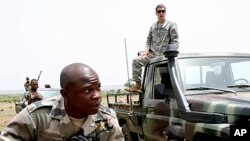The Economic Community of West African States (ECOWAS) said it is preparing a mediation team to help broker a cease-fire in Mali, following a resurgent Tuareg rebellion ahead of the April 29 presidential election.
Official campaigning began last week. Some 20 candidates are vying to succeed outgoing President Amadou Toumani Toure, who is stepping aside after two terms in office.
ECOWAS Communications Director Sonny Ugoh said the sub-regional bloc’s mediation team will seek to encourage dialogue between the government and the Tuareg rebels to end the conflict.
“We are in the process of trying to engender dialogue between the stakeholders, the government and the rebels so that we can see how we can achieve a ceasefire,” said Ugoh. “We want to bring the two parties to the table to discuss the issues that are behind the rebellion, and to find a common ground, and to find a solution through dialogue.”
The Tuareg rebels launched a new rebellion on January 17 clashing with government forces in several northern towns.
Some Malians expressed concern the violence could disrupt next month’s vote.
Several humanitarian organizations have expressed concern the ongoing clashes between government forces and the rebels are forcing residents to flee to neighboring countries.
The U.N. refugee agency said at least 22,000 people in northern Mali linked to the rebellion have fled to neighboring countries to avoid the fighting. The U.N. body estimates 10,000 people have arrived in Niger, with many sleeping out in the open. It estimated that another 9,000 fled to Mauritania and 3,000 more to Burkina Faso.
Ugoh said the conflict in northern Mali could undermine the regional bloc’s initiative to encourage economic cooperation and bolster security in West Africa.
“The shooting and the killing is not helpful to the country; it’s not helpful to West Africa, and it’s not helpful to the agenda of promoting of socio-economic integration,” said Ugoh.
The ECOWAS commission President Kadré Désiré Ouedraogo led a fact finding mission to Mali following the rebellion by the Tuareg rebels to find ways of resolving the security and humanitarian challenges the West African nation faces.
“What we are doing now is consistent with the ECOWAS instrument regarding conflict prevention, resolution and peacekeeping. It gives us the latitude to encourage engagement of all the parties,” said Ugoh. “We are still trying to articulate how this [mediation team] is going to work. But, I can assure you that now that we are engaged at the level of the president of the commission that shows the seriousness we attach [to] it.”
Ugoh expressed confidence a lasting peace could be reached to ensure the upcoming elections are devoid of violence.
“We believe that this is possible and that is why we are going on that track, and we see it as [peace that is] going to happen sooner [rather] than later… and, with the cooperation of the parties, we would be able to bring them together so that they can talk,” he said.




